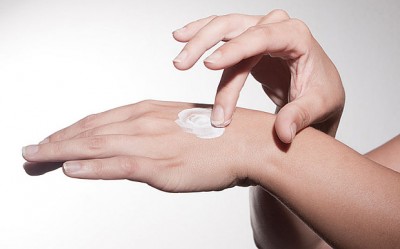
Those who believe that beauty is only skin deep may need to think again. For the first time, scientists have gone right into our DNA to develop the most advanced anti-ageing serum ever created.
The new treatment, developed by one of Britain’s leading scientific innovators, is personally tailored to each individual and could revolutionise how women – and maybe even men – approach their daily skincare regime.
It relies on a new microchip that allows the product’s creators to analyse a person’s genetic code within just 30 minutes. Through this, they can discover how fast their body degrades collagen – the structural protein that keeps the skin plump and supple – and their level of antioxidants, which protect against damaging free radicals.
Using this information, they develop a personalised anti-ageing cream to deliver the right amount of collagen and antioxidants to reduce the appearance of wrinkles.
Clinical trials over 18 months have already suggested that the product, named Geneu (pronounced ‘gene you’), reduces fine lines and wrinkles by up to 30 per cent within just 12 weeks.
The skincare range was developed by Prof Chris Toumazou, Regius Professor at Imperial College, London, who invented the cochlear ear implant, which helped 10,000 deaf children to hear, the artificial pancreas for Type 1 diabetics and the wireless heart monitor.
The range is possible because of his latest invention, a handheld microchip device, which can sequence DNA in 30 minutes. He recently won European Inventor of the Year 2014 for the breakthrough.
Prof Toumazau hopes that by bringing the technology into the consumer arena, it will help the public get used to the idea of DNA checks which will ultimately benefit their health and encourage an era of personalised medicine.
“It’s not really skincare, it’s skin health,” he said. “The skin is the largest organ in the body.”
At Geneu’s New Bond Street clinic in central London, doctors take a cheek swab before isolating the DNA strands and injecting them into the microchip, which is then fed into a sequencing computer. In 30 minutes, the profile is ready and a serum can be created.
Dr Maria Karvela, one of the scientific advisers at Geneu, who administers the test said: “As soon as I heard about Chris and the microchip, I wanted to be part of it. It really is cutting-edge science.”
Most people degrade collagen at an average speed, but some will use up supplies faster, while others hardly at all, depending on mutations in the gene which instructs the building of the protein. People who still have fantastic skin into their sixties and seventies are probably slow collagen degraders.
But the ‘one size fits all’ approach of most modern creams and serums means that skin is often undernourished or overloaded.
Prof Toumazou added: “Too much collagen will damage the skin. You will get collagen overload. Too little and it won’t have an impact.
“This test shows exactly how much can be metabolised.”
As well as containing collagen, the serums hold active ingredients including white mulberry root extract, Vitamin A and C, red baron grass and tripeptides, amino acids which improve the skin’s condition and encourage cell renewal to boost collagen production.
At the moment, the serum looks at just two elements of the skin, but Prof Toumazou hopes to include SPF and other markers of skin health.
Prof Toumazou claims the product is perfect for ‘pre-Botox ladies’. The serum costs £600 for a four-week course, which includes the consultation.
And it is attracting men as well as women. The beauty lab in New Bond Street, London, could be a set from a James Bond film, with its futurist décor and strobe-lit testing pods. The creative director of Geneu is Nick Rhodes, the founder and keyboardist from Duran Duran.
Prof Toumazou is now hoping his microchip will eventually be used to test how well people can process medications such as statins so that doses can be individually altered. He recently gave a lecture at the Royal Society to try to win over the doubters.
“I considered setting up in Harley Street, but this isn’t about dermatology or fixing the skin, it’s about preventing problems and making healthy skin healthier,” he said.
“I want to fight the claims about pseudoscience. So if the Royal Society asks, ‘Chris, what are you doing?!’ I am happy to tell them.
“In a way, it’s not about the serum, it’s about the science. And people are fascinated by what is going on in their DNA. They want to know about themselves, and they come away with something that’s entirely bespoke to them.”
Telegraph.UK.

Leave a Reply
You must be logged in to post a comment.